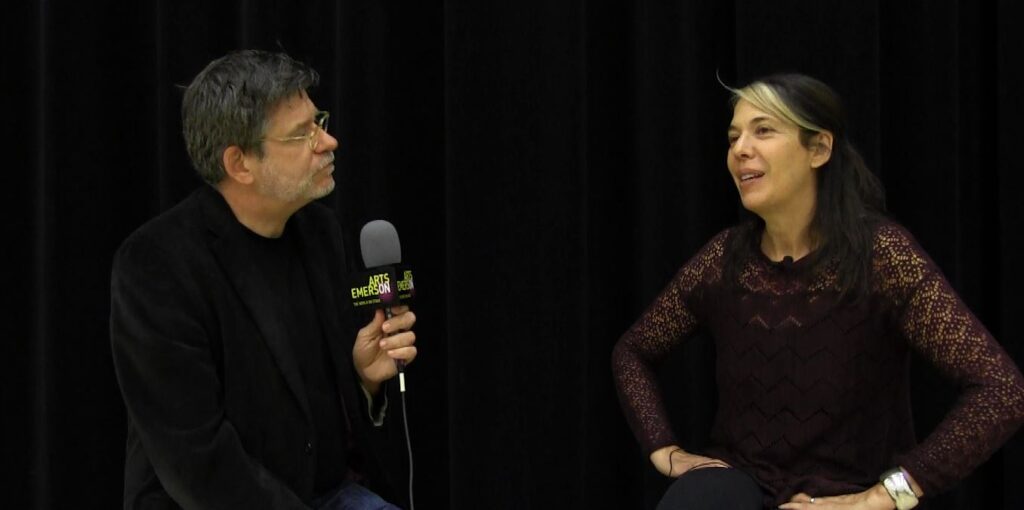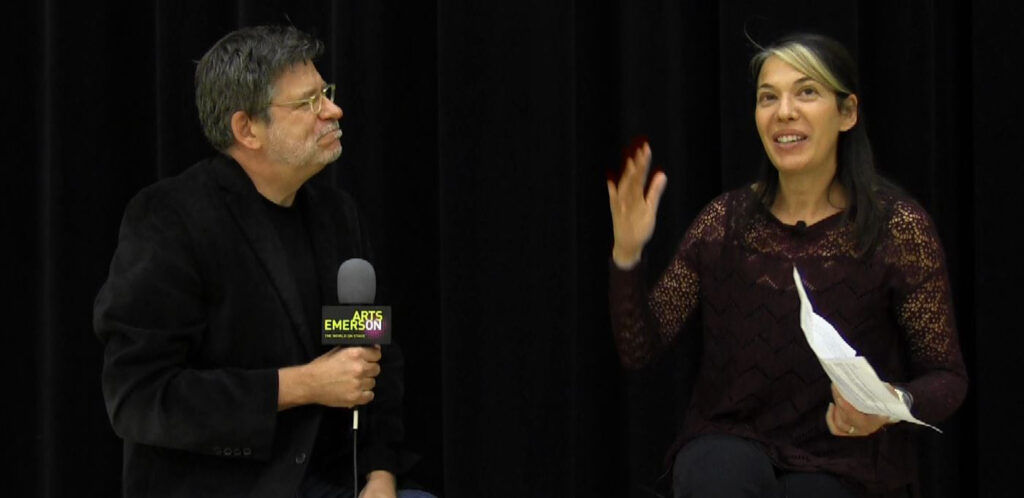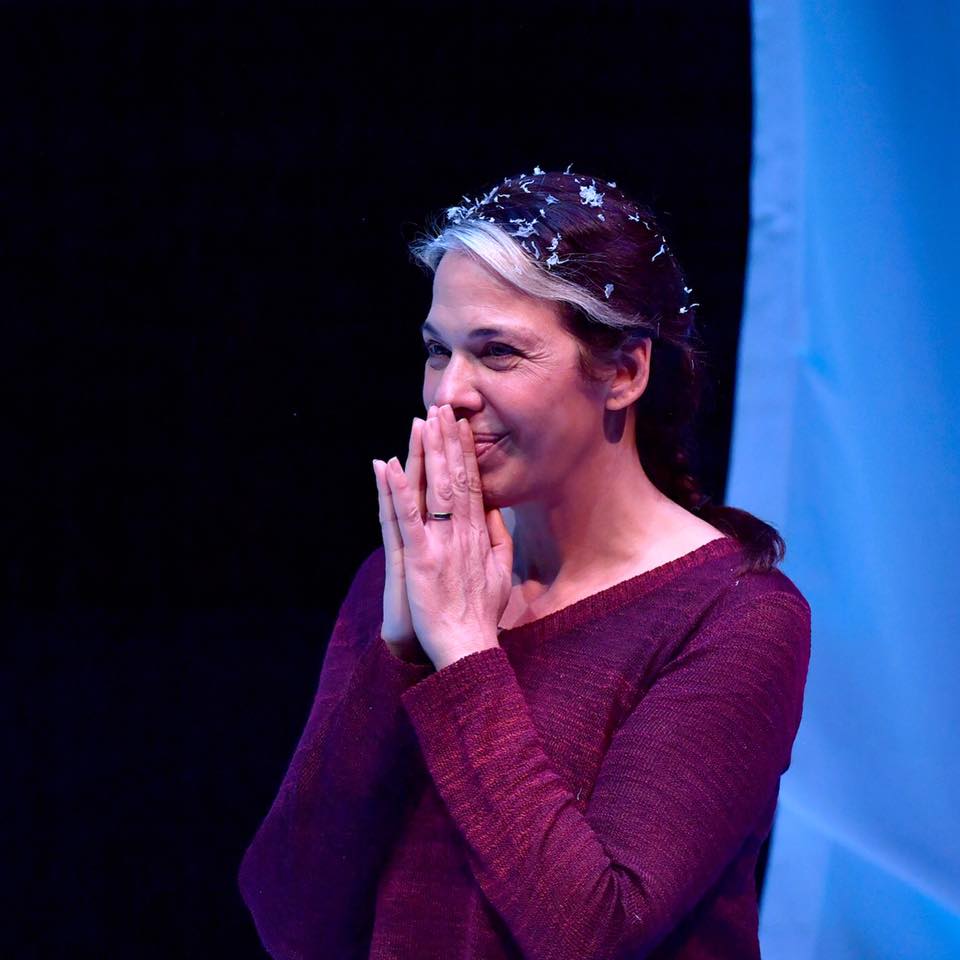Share This:
November 10, 2016 | Theatre,
‘Mala’ Means Bad: A conversation between Melinda Lopez & David Dower
Early on in this World Premiere, one-woman-show, Melinda Lopez tells the gathered audience, “’Mala’ means ‘bad.’ Not that you have done something bad, but that you are, in your core, bad.” It’s a haunting indictment of character that looms over the entire play. Here, playwright and performer Melinda Lopez sits down with ArtsEmerson co-artistic director, and the director of Mala, David Dower, for a conversation about the emotional, cathartic, honest play they’ve created. In Mala, Lopez attempts to unpack those brutal moments where even your closest loved ones question your intentions, even as you’re desperately trying to do what’s best for them.
M: Why did you decide to do this show?
D: This show is really beautiful. The thing that I thought was so special was that you had the discipline and foresight to capture it as it was happening. You’ve structured a piece that captures someone in the middle of it. You found humor in there.
M: It’s a coping mechanism. The harder things get, the funnier they are. Humor is the most useful way to survive.
D: Was there ever a thought that it was not a solo piece?
M: No. it never had those legs. It always seemed like one voice and a series of increasingly desperate attempts to communicate. Plays are sort of born, the way that they’re meant to be born. The play comes with its own structure and its own rules.
M: What I really wanted to do with this piece was lay out some honest experiences that I think are more recognizable than we as society like to admit.
D: This is her story and the character and audience are riding together.
M: That’s what theatre is for. It’s for creating a community with a group of strangers- you arrive as strangers and you leave friends.
D: We have this image of Mala jumping in her car and having to drive down Fresh Pond Parkway to get her home. Anybody who lived here in that time of winter 2014 —and anyone who didn’t live here can’t imagine how visceral that time was for us. Even just the car on the road at that point
M: Even parking and treachery and you couldn’t see the intersections, you didn’t know who was coming and that winding and perilous road. It’s one of the most Bostonian stretches of road. You have to get somewhere fast driving in Boston. It’s not ever a good mix of ingredients. That sense of isolation and panic and just letting go, and then fighting back which is also a very winter experience.
D: There’s this beautiful moment towards the end of the play when she realizes she’s going to survive it. That’s a realization: this will pass. Whether it’s winter or the situation that her mother is in…
M: There we are with the human condition. Why are we here? What are we meant to do with our lives? How do we best love the people who love us most in the world?
D: it’s also the human comedy of it, is just to laugh. What is there to be done than to laugh and accept it.

M: There’s this interesting moment where you become the parent to your parent. And some of us are prepared for that and some of us are less prepared and it always comes as a shock as I’m deciding for them and making those choices. You know you have to be generous, patient, and it’s hard.
D: Watching my parents, some of the arguments they’re getting in now are grade school. They quibble over memories. And I watch my brother and sister around them and my brother turns into exactly who he was as a kid and what he needs from them and my sister is still care-taking, she was always the big sister and goes right into those roles. I also think you have something in here that will speak to a lot of people which is the Sandwich Generation.
M: The sandwich! Yeah, so being the sandwich in between the children and the parents, and the care-taking of both. Certainly living it, and getting torn into different directions — not to mention trying to have your life. You have three generations fighting for the attention and the time of the sandwich filling.
D: In this play, you have a character who waited until she could be the mom she wanted to be.
M: It’s an interesting function of the way we live now. It’s this belief that we have plans, and the universe makes other plans. Our plans are going to make sense and lead to the outcome we predict. It’s a universal experience and it’s hard to talk about. People don’t teach us how to talk about our death, people we love, the natural process of aging. The character of Mala is very witty and smart, but also cynical.

D: We see the struggle in the show when all of a sudden out pops, “But of course I love my mother”. What is that?
M: My experience as daughter, mom etc. Once your life is full of big love and at the same time, how much you love them seems to have no effect on how badly you can screw up and the terrible mistakes, accidents, etc. they collide often. The more you love someone, the more you are likely to screw up.
D: You’ve written for this character: “no one teaches you how to do the big stuff.” I don’t think any of it is necessarily teachable. There’s a space that opened for my son the day he was born that did not exist the day before he was born. There’s a space that opens in the marriage that doesn’t exist otherwise. I have a sense that it’s going to be particular. Did you feel as though a space opened that you could have been prepared for?
M: Given the nature of my relationship with my family, if they tried to teach me and sat me down, I would not have listened. We observe behavior and that’s how we learn. My greatest learning curve was finding other peers to talk to. That was enormously important in the learning curve. You’re not alone and you’re normal. I don’t think this play is about teaching anyone anything. It’s about come and expand your life experience. That’s the only way we learn.

Mala runs through November 20th, 2016 inside the Emerson/Paramount Center. Call 617-824-8400 for tickets.




Leave a Reply